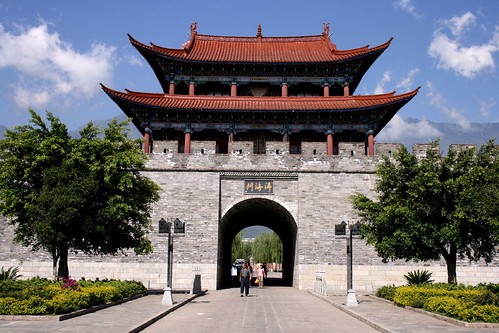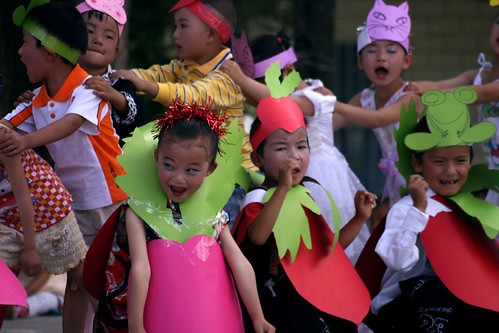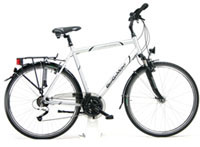Day 57-62: Magical scenery
Dali is a beautiful town situated next to the Erhai Lu Lake, one of the largest in China, with the stunning Jade Green Mountains as an ideal backdrop. Dali’s small cobbled streets, cozy restaurants and cafés make this ancient city a wonderful place to stay a few nights after four days of demanding cycling. I instantly took the opportunity to treat myself to all the delicious food I could get my hands on. The city offers a variety of snacks easily accessible along the small streets, making me eat constantly. For lunch on my second day I had a stick of seasoned grilled potato, two fried rolled rice cakes, a plate of vegetable dumplings, three juicy plums, a banana, a sesame muffin, a Chinese croissant, a few local cookies, a fruity icy juice drink, and two ice cream cones to top it off. By the time I had finished eating it all, it was time for dinner. After four lonesome days on the road I was also keen on meeting other travelers to share experiences and speak anything but broken Chinese. I was fortunate to run into two Swedish girls that also just had arrived in town. It felt relieving having someone speak my native language to me instead of foreign blather.
 There is not much to do in Dali but to wonder around the pleasant streets and alleys and absorb the atmosphere, drink, eat and relax. However, I and the two Swedish girls agreed to go on a short boat tour on the lake, and I did my own cycle tour around town to familiarize myself with the surroundings and the local people. I had three full days of rest in Dali and when the fourth morning arrived I was excited to get back on the road. I left early to catch the morning mist and fresh air. Cycling out of Dali was majestic. The sun had just appeared over the mountains to the east, illuminating the Erhai Lu Lake and castings its rays on the peaks to the west. In the perfect moment when I was cruising at my average comfortable speed, the fresh morning air softly striking my face, I heard a sudden noise from the back of my bicycle. I stopped to see that my rear rack had loosened and was pressing against the rear wheel. At first I was troubled, but soon realized that all the bolts had just come off due to the bumpy roads towards Dali. They simply had been shaken loose and I had forgotten to tighten them. Luckily only one bolt was missing and I was able to replace it easily to continue to enjoy this extraordinary morning. I expected a mountain pass to arrive sometime during the day and at 45 kilometers my anticipation was confirmed. I fought my way up the steep road for 20 kilometers until I finally reached Beija, my intended destination for the day. However, Beija was not only far from the road, it is located a few hundred meters below the road, making it difficult to reach. Again I trusted my anticipation and continued pedaling, hoping the road was going to turn downhill shortly. Half an hour later I was in the next town, Songgui, having rolled down the mountain at record-braking speeds (new max km/h: 64,3). When I arrived in Songgui I felt great. Despite the 97 kilometers I had bicycled, my muscles were not hurting, my neck and shoulders pain-free and I was in good frame of mind. However, Sunggui quickly changed my mood. This small, unfriendly and dirty town I was going to be very happy to leave behind. The only event to enlighten my stay was a children’s play in action just outside my grubby hotel, honoring the children’s day. Little girls and boys were heavily dressed made up and made up, resembling small clowns hopping around the stage, singing badly and out of sync. It was very cute.
There is not much to do in Dali but to wonder around the pleasant streets and alleys and absorb the atmosphere, drink, eat and relax. However, I and the two Swedish girls agreed to go on a short boat tour on the lake, and I did my own cycle tour around town to familiarize myself with the surroundings and the local people. I had three full days of rest in Dali and when the fourth morning arrived I was excited to get back on the road. I left early to catch the morning mist and fresh air. Cycling out of Dali was majestic. The sun had just appeared over the mountains to the east, illuminating the Erhai Lu Lake and castings its rays on the peaks to the west. In the perfect moment when I was cruising at my average comfortable speed, the fresh morning air softly striking my face, I heard a sudden noise from the back of my bicycle. I stopped to see that my rear rack had loosened and was pressing against the rear wheel. At first I was troubled, but soon realized that all the bolts had just come off due to the bumpy roads towards Dali. They simply had been shaken loose and I had forgotten to tighten them. Luckily only one bolt was missing and I was able to replace it easily to continue to enjoy this extraordinary morning. I expected a mountain pass to arrive sometime during the day and at 45 kilometers my anticipation was confirmed. I fought my way up the steep road for 20 kilometers until I finally reached Beija, my intended destination for the day. However, Beija was not only far from the road, it is located a few hundred meters below the road, making it difficult to reach. Again I trusted my anticipation and continued pedaling, hoping the road was going to turn downhill shortly. Half an hour later I was in the next town, Songgui, having rolled down the mountain at record-braking speeds (new max km/h: 64,3). When I arrived in Songgui I felt great. Despite the 97 kilometers I had bicycled, my muscles were not hurting, my neck and shoulders pain-free and I was in good frame of mind. However, Sunggui quickly changed my mood. This small, unfriendly and dirty town I was going to be very happy to leave behind. The only event to enlighten my stay was a children’s play in action just outside my grubby hotel, honoring the children’s day. Little girls and boys were heavily dressed made up and made up, resembling small clowns hopping around the stage, singing badly and out of sync. It was very cute.  The total distance to Lijiang, where I planned my next longer stop, and also to engage in some trekking, is approximately 180 kilometers, meaning that I physically could have completed the stretch in two days. But I was looking forward to some relaxed cycling and give myself time to thoroughly appreciate the beautiful, mountainous scenery. Therefore, the following day I planned to only pedal 30 kilometers to Heqing, a city only 45 kilometers from Lijiang. About half way I stopped to ask for direction as I have been forced to many times due to the Chinese road sign, or more correctly, the lack of Chinese road signs. I approached a group of men repairing a dusty, old truck ready for the junkyard. When I presented my simple question of directions the men started to argue immediately. An older man was convinced I should travel back one kilometer then take a left, something I was not too keen on. A younger, more aggressive man had another solution. He suggested me to take a right just at the next intersection visible from where we were standing, then slowly turn right, and at last make a sharp left to catch the main road. Both men drew detailed drawings of their recommended routes, and it almost felt like they were competing for my attention. From what I could understand the latter directions was a short-cut and would save me time. On the other hand, it seemed very complicated opposed to the first option. When I hesitated, not sure who I should let down and who I wanted to declare winner, the younger man gestured that he and his wife would show me the way. We traveled down the road, he and his wife on their motorbike, me on my bicycle, and quickly left the main road onto a smaller path leading to a small village. The dirt road was bumpy, filled with pot-holes and full of sand and rocks. Slowly we made our way through the village to enter another one, on small winding roads between mud houses, cows, chickens, children in chock, old men dropping their pipes in astonishment, and when I though we would come to a larger road, we crossed into another village. After five kilometers, and at the point where I felt I could not find my way back, I got anxious and jumped off my bicycle, illustrating that we were going the wrong direction, heading south instead of north. I was starting to wonder what this man and his wife were up to. Where were they taking me? What did they want? The man positively signed that we were almost there, at the bigger road leading to Heqing. I looked him in the eyes, shook his hand and hoped for the best. Two kilometers later he pointed straight ahead. And there it was; Road S212 going to Heqing. I shook his hand once more, gave his wife a big smile and rolled my bicycle over the last bit of dirt road onto perfect tarmac. Back on the big road I realized the magnitude of their kindness. They had taken more than half an hour of their time traveling seven kilometers just to show me a shorter, faster way. I felt truly bad about not trusting them, and thinking of them as bad people.
The total distance to Lijiang, where I planned my next longer stop, and also to engage in some trekking, is approximately 180 kilometers, meaning that I physically could have completed the stretch in two days. But I was looking forward to some relaxed cycling and give myself time to thoroughly appreciate the beautiful, mountainous scenery. Therefore, the following day I planned to only pedal 30 kilometers to Heqing, a city only 45 kilometers from Lijiang. About half way I stopped to ask for direction as I have been forced to many times due to the Chinese road sign, or more correctly, the lack of Chinese road signs. I approached a group of men repairing a dusty, old truck ready for the junkyard. When I presented my simple question of directions the men started to argue immediately. An older man was convinced I should travel back one kilometer then take a left, something I was not too keen on. A younger, more aggressive man had another solution. He suggested me to take a right just at the next intersection visible from where we were standing, then slowly turn right, and at last make a sharp left to catch the main road. Both men drew detailed drawings of their recommended routes, and it almost felt like they were competing for my attention. From what I could understand the latter directions was a short-cut and would save me time. On the other hand, it seemed very complicated opposed to the first option. When I hesitated, not sure who I should let down and who I wanted to declare winner, the younger man gestured that he and his wife would show me the way. We traveled down the road, he and his wife on their motorbike, me on my bicycle, and quickly left the main road onto a smaller path leading to a small village. The dirt road was bumpy, filled with pot-holes and full of sand and rocks. Slowly we made our way through the village to enter another one, on small winding roads between mud houses, cows, chickens, children in chock, old men dropping their pipes in astonishment, and when I though we would come to a larger road, we crossed into another village. After five kilometers, and at the point where I felt I could not find my way back, I got anxious and jumped off my bicycle, illustrating that we were going the wrong direction, heading south instead of north. I was starting to wonder what this man and his wife were up to. Where were they taking me? What did they want? The man positively signed that we were almost there, at the bigger road leading to Heqing. I looked him in the eyes, shook his hand and hoped for the best. Two kilometers later he pointed straight ahead. And there it was; Road S212 going to Heqing. I shook his hand once more, gave his wife a big smile and rolled my bicycle over the last bit of dirt road onto perfect tarmac. Back on the big road I realized the magnitude of their kindness. They had taken more than half an hour of their time traveling seven kilometers just to show me a shorter, faster way. I felt truly bad about not trusting them, and thinking of them as bad people.When I arrived in Heqing I was surprised of its beauty and spend most of the day cycling around the streets, getting puzzled looks from the residents. From the day I left Kunming the weather had been absolutely perfect. Everyday I woke up to a blue sky and a soft breeze. Because of the altitude it does not get unbearably hot, although the mid-day temperatures can climb above 30 degrees Celcius. Still, the breezy winds keep me cool and I can actually appreciate the warmth of the sun at times, something unthinkable in Vietnam. The day in Heqing was no exception. On my way to the city, the sky was so clear I was even able to catch a glimpse of the glaciers far away in the distance. The sight had inspired me to move on despite the beauty of Heqing and the next morning I left my hotel at 5:45, again to witness a clear sky. Leaving Heqing I was stunned by the magnificence of nature. As I slowly pedaled my way through the landscape I could see the sun slowly rise above the mountains. The more it appeared the more the landscape around me illuminated. The bright green rice fields took a dreamlike color of green, only imaginable in my fantasy. The sky was perfectly clear in various shades of blue. The fields were full of workers harvesting in the golden rays of the sun, their long shadows creating a symmetrical pattern in the landscape. My eyes filled with tears. If it was from the stunning scenery or the cold wind in my face, I could not tell, but I was certainly moved by the scale of the experience. Before I knew it, I had arrived in Lijiang.
 Lijiang is similar to Dali that it is jammed with Chinese tourists. They are everywhere with their sun umbrellas, cameras, camcorders, matching clothes and flags. They seem to really enjoy being labeled 'tourist' because they strive to live up to it. The old town of Lijiang is also typically constructed in a beautiful traditional Chinese style, and offers equally many souvenir shops. As a result, I will shortly head back out into the wild, despite the beauty of the city. This time, however, I will walk.
Lijiang is similar to Dali that it is jammed with Chinese tourists. They are everywhere with their sun umbrellas, cameras, camcorders, matching clothes and flags. They seem to really enjoy being labeled 'tourist' because they strive to live up to it. The old town of Lijiang is also typically constructed in a beautiful traditional Chinese style, and offers equally many souvenir shops. As a result, I will shortly head back out into the wild, despite the beauty of the city. This time, however, I will walk.SLIDESHOW DALI TO LIJIANG







No comments:
Post a Comment